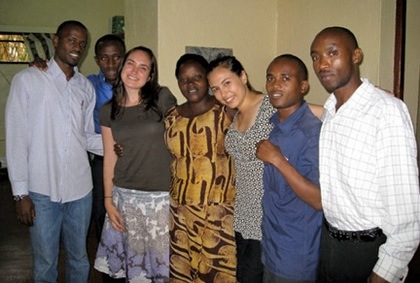When the Rwanda Initiative was launched in 2006, the media capacity-building project consisted of founder Allan Thompson, assistant professor in Carleton’s school of journalism and communication, and three other veteran journalists taking up positions as visiting lecturers at the National University of Rwanda. Their effort to address the shortage of journalism educators in Rwanda has since expanded: the initiative has sent more than 70 Canadians to Rwanda to teach journalism, work as media interns or conduct training sessions with working journalists, thereby building the university’s capacity to teach journalism and improving media standards in the country.
Now a pilot phase has expanded the initiative to encompass capacity building in public policy areas. The Arthur Kroeger College of Public Affairs sent four students to Rwanda to intern for the summer with the United Nations Development Program, the National University of Rwanda and the United Nations High Commission on Refugees.
“The Rwanda Initiative has been of incalculable benefit to Carleton journalism students. We wanted to extend the opportunity to students in other disciplines,” says Chris Dornan, director of Kroeger College. “The type of experience gained by living and working in Rwanda is a perfect complement to what students study at Kroeger.”
When Dornan arranged the internships, he wanted students to have “more meaningful tasks than making photocopies”, but warned them not to expect to be creating policy. So it was a surprise for student Alexandra Terrana when she was tasked with drafting a policy for the integration of disabled students at the National University of Rwanda.

Alexandra Terrana (third from left) and Jessica Hum (third from right) interned at the National University of Rwanda, where they were warmly welcomed by their colleagues, pictured.
“I’d taken a course that detailed the framework on which policy is made, so I knew where to start, but it was a big learning curve,” says Terrana, who conducted an audit of physical facilities and practices that created barriers, reviewed policies from other east African universities, and made recommendations achievable with a small budget. “I’m proud of what I accomplished.”
“Kroeger College isn’t just providing a classroom education, but is opening doors for students,” says Terrana, for whom the internship affirmed the policy field is for her. “The internships give students international experience that would be difficult to get otherwise. Even getting an internship through other organizations is nearly impossible without international experience.”
The public policy internship program is open to students between their third and fourth years of study, a point at which they have a good basis of knowledge and can bring their experiences to bear on the classroom.
Dornan strives to make the placements valuable to the students and the organization in which they are working. He has already begun to arrange placements for next year, particularly with the National University of Rwanda, where the ties to the Rwanda Initiative are strong and opportunities for students to join existing research teams are high.
Dornan envisions a time when the Kroeger component will expand to include faculty policy experts to liaise with agencies and ministries, helping to establish the policy side of the initiative, particularly as Carleton’s institute of African studies brings together researchers.
In the meantime, Dornan is focused on providing a learning opportunity for students. “If all that we accomplish is that a number of students a year get to experience living and working in Rwanda on meaningful projects, then I’m happy,” he says.
Next ..
Faculty news: Seeking refuge